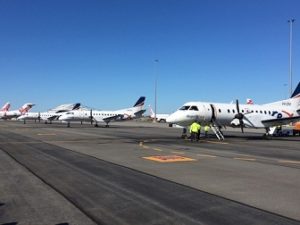 Rex has become the latest Australian airline to set deadlines for staff to obtain Covid vaccination – and although it’s following the example of Qantas and Virgin Australia, Rex looks like being the first to have all its frontline staff vaccinated. Vaccination is gaining support fast.
Rex has become the latest Australian airline to set deadlines for staff to obtain Covid vaccination – and although it’s following the example of Qantas and Virgin Australia, Rex looks like being the first to have all its frontline staff vaccinated. Vaccination is gaining support fast.
Noisy demonstrations aside, vaccine hesitancy is plunging across Australia. It fell from 20.3% on 20 August to 16.7% on 12 September, according to latest data. Numbers of vaccinated people are growing rapidly as the jab is increasingly seen as the only way out of endless lockdowns. Companies and individuals are losing patience with vaccine hesitancy and various anti-vax conspiracy theories.
- Rex has confirmed that all frontline, customer-facing staff must be fully vaccinated against Covid-19 by 1 November 2021. It is set to be the first Australian airline to achieve that goal. The rule covers company employees working at check-in and all pilots and cabin crew across Rex regional and domestic networks.
- Virgin Australia concluded talks with employees and unions earlier this month, after which it delivered a final policy dictating that all frontline and airport-based Virgin Australia team members must be vaccinated by 15 November 2021 – and all other office-based team members by 31 March 2022.
- Qantas has already stated that it will carry only vaccinated passengers when it resumes international services – hopefully by Christmas on some routes. No jab, no fly! Qantas will require all frontline staff (cabin crew and pilots among them) to be vaccinated by 15 November 2021. All other Qantas employees must get the jab by the end of March 2022.

Rex planes on tarmac
Other airlines around the world are taking similar positions and corporations are joining them. Proving your vaccination status is becoming a necessary part of booking group tours or cruises, or staying in hotels. In NSW, proof of vaccination will soon be necessary to enter pubs, restaurants, cinemas, theatres and entertainment venues.
Few exceptions will be tolerated. Writing in The Conversation a few days ago, Douglas Laycock, Professor of Law at the School of Law, University of Virginia, noted that governments have “a compelling interest in preventing significant threats to other people’s health, and especially so in a pandemic”.
Laycock wrote: “The unvaccinated endanger people who are immunosuppressed or cannot be vaccinated because of their age or any other medical reason. The unvaccinated also endanger people who are vaccinated because no vaccination is 100% effective, as is evident from the number of breakthrough Covid-19 infections in the US.”
The same holds true in Australia and elsewhere.
In its new edict, Rex says that its passengers “can be reassured that the compulsory staff vaccination policy will mean that they will be travelling in the safest possible circumstances”.
Before consulting with various unions and workplace health and safety representatives, Rex conducted a survey of all its staff. An unprecedented 90% of staff responded.
“The results of the survey show that, even without the mandatory requirement for vaccination, about 90% of the entire workforce would have already voluntarily been vaccinated by the deadline of 1 November 2021,” the airline stated.

Photo by Nataliya Vaitkevich, Pexels
The full details of the Rex survey are:
- 59% already fully vaccinated;
- 31% had either received their first vaccination or had booked an appointment to be vaccinated;
- 8% not sure about vaccination; and
- 2% opposed to vaccination for medical or other reasons.
“We have a duty of care to both our passengers and staff to provide the safest possible environment,” Rex deputy chairman, John Sharp, declared.
“As we provide an essential service operating to regional centres and remote communities throughout Australia, it is incumbent upon us to do whatever we can to help those residents remain safe and healthy.”
Written by Peter Needham
















